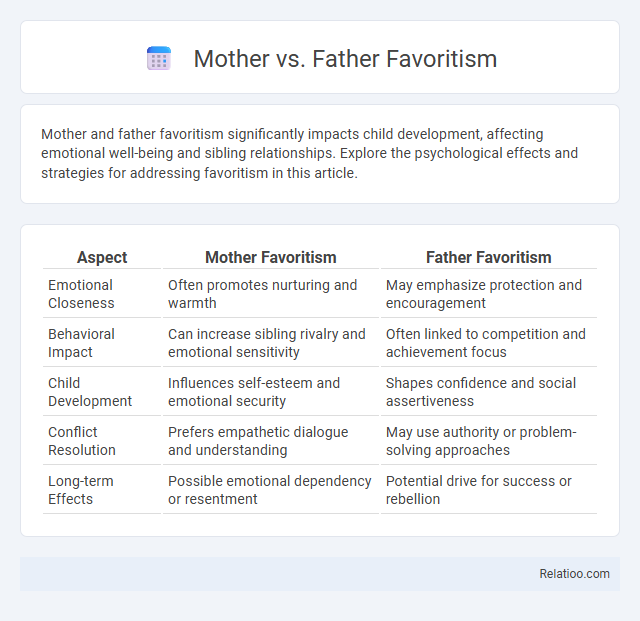Mother and father favoritism significantly impacts child development, affecting emotional well-being and sibling relationships. Explore the psychological effects and strategies for addressing favoritism in this article.
Table of Comparison
| Aspect | Mother Favoritism | Father Favoritism |
|---|---|---|
| Emotional Closeness | Often promotes nurturing and warmth | May emphasize protection and encouragement |
| Behavioral Impact | Can increase sibling rivalry and emotional sensitivity | Often linked to competition and achievement focus |
| Child Development | Influences self-esteem and emotional security | Shapes confidence and social assertiveness |
| Conflict Resolution | Prefers empathetic dialogue and understanding | May use authority or problem-solving approaches |
| Long-term Effects | Possible emotional dependency or resentment | Potential drive for success or rebellion |
Understanding Parental Favoritism: An Overview
Parental favoritism refers to the differential treatment of children by mothers or fathers, impacting sibling relationships and child development. Research indicates that maternal favoritism often centers on emotional support and nurturing, while paternal favoritism tends to emphasize achievement and discipline. Understanding these distinct patterns helps elucidate family dynamics and guides interventions to promote equitable parenting and psychological well-being among siblings.
Signs of Mother Favoritism in Family Dynamics
Signs of mother favoritism in family dynamics include consistent emotional support and attention directed predominantly toward one child, leading to imbalanced confidence and sibling rivalry. You may notice unequal distribution of resources, praise, and disciplinary actions favoring a particular child, which can create long-term psychological effects and family tension. Recognizing these patterns helps address favoritism and promotes healthier, more equitable relationships within the family.
Indicators of Father Favoritism Among Siblings
Indicators of father favoritism among siblings often include unequal distribution of attention, resources, or privileges favoring one child over others. Your perception of favoritism can manifest through preferential support for academic achievements, sports, or emotional bonding with the favored child. Observing consistent bias in decision-making or parental involvement helps identify father favoritism distinct from general or mother favoritism.
Psychological Effects on the Favored Child
Mother favoritism often leads the favored child to develop heightened self-esteem but may also cause guilt or anxiety due to perceived pressure to meet maternal expectations. Father favoritism can reinforce traditional gender roles, impacting the child's identity and emotional resilience by fostering dependency or competitiveness. General favoritism creates emotional imbalance, potentially resulting in favoritism-induced sibling rivalry, attachment issues, and long-term impacts on the child's mental health and interpersonal relationships.
Emotional Impact on the Unfavored Child
Mother vs father favoritism significantly affects the emotional well-being of the unfavored child, often leading to feelings of rejection, low self-esteem, and increased anxiety. Unfavored children may develop long-term trust issues and struggle with emotional regulation due to inconsistent parental affection. Research shows that maternal favoritism tends to cause deeper emotional scars because of the traditionally nurturing role mothers play in a child's development.
Gender Roles and Parental Bias
Mother favoritism often aligns with nurturing gender roles, emphasizing emotional support and caregiving, while father favoritism is linked to authority and discipline, reinforcing traditional paternal biases. Parental bias influences children's self-esteem and identity development, with gender roles shaping expectations and preferential treatment. Understanding these dynamics helps address the psychological impact of favoritism and promote equitable parenting practices.
Root Causes of Mother vs Father Favoritism
Root causes of mother vs father favoritism often stem from differing parental roles, emotional bonds, and societal expectations. Mothers tend to develop favoritism based on nurturing and caregiving patterns, while fathers may show favoritism influenced by shared interests or perceived achievements. Understanding these roots helps you recognize how familial dynamics shape preferential treatment.
How Favoritism Shapes Sibling Relationships
Favoritism, whether from a mother or father, significantly shapes sibling relationships by creating feelings of jealousy, competition, and resentment among siblings. Your perception of parental favoritism can influence emotional bonds, leading to long-term impacts on trust and communication within the family. Understanding these dynamics helps in addressing conflicts and fostering healthier sibling connections.
Breaking the Cycle: Addressing and Preventing Favoritism
Breaking the cycle of favoritism requires conscious efforts to recognize and address biases exhibited by both mothers and fathers towards their children, which can profoundly affect sibling relationships and self-esteem. Implementing open communication strategies and equally distributing attention promotes fairness and emotional security within the family. Educational programs and family counseling support parents in understanding the psychological impact of favoritism, ultimately fostering healthier family dynamics and preventing long-term emotional harm.
Building Balanced Parent-Child Relationships
Mother vs father favoritism impacts children's emotional development and sense of security, influencing attachment styles and self-esteem. Favoritism from either parent can create sibling rivalry and imbalance in family dynamics, hindering healthy communication and trust. Building balanced parent-child relationships requires consistent, equitable attention and validation from both parents to foster mutual respect and psychological well-being.

Infographic: Mother vs Father Favoritism
 relatioo.com
relatioo.com